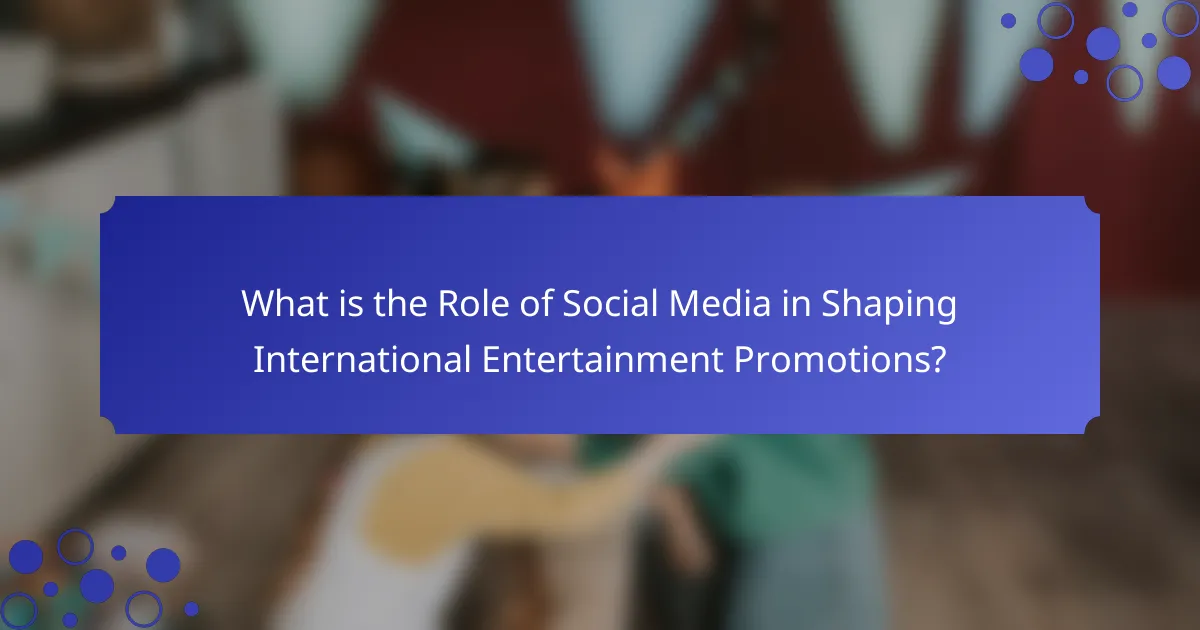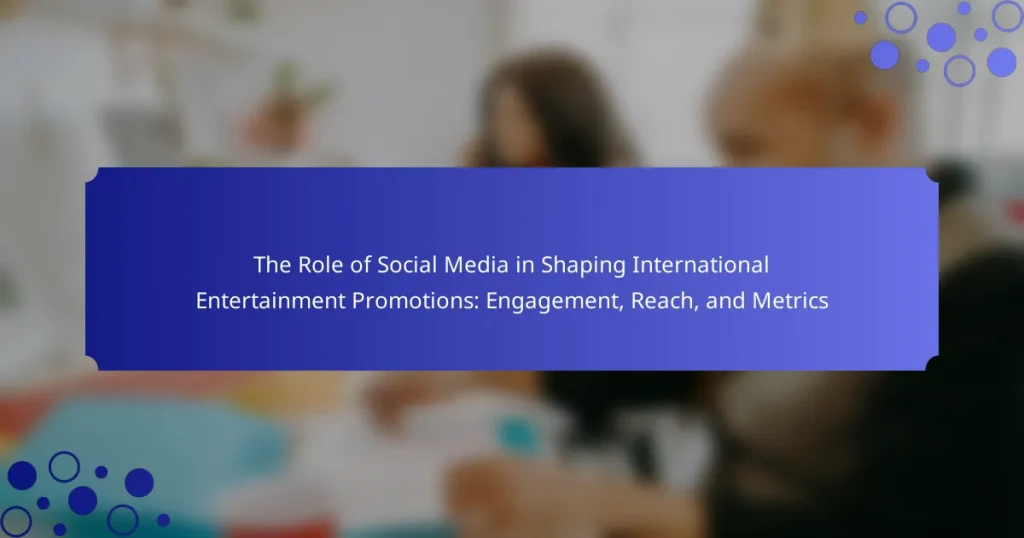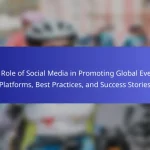Social media significantly influences international entertainment promotions by enabling direct engagement between creators and global audiences. Platforms such as Instagram, Twitter, and TikTok facilitate real-time interactions that foster audience loyalty and enhance brand connection. With approximately 4.9 billion users worldwide as of 2021, social media extends the reach of promotional content, allowing for targeted marketing strategies across diverse demographics. Additionally, it provides valuable metrics for measuring the success of campaigns, offering insights that help refine future promotional efforts. Overall, social media is essential for expanding the global presence of entertainment promotions.

What is the Role of Social Media in Shaping International Entertainment Promotions?
Social media plays a crucial role in shaping international entertainment promotions. It facilitates direct engagement between creators and audiences across borders. Platforms like Instagram, Twitter, and TikTok enable real-time interaction and feedback. This interaction enhances audience connection and loyalty to entertainment brands. Social media also amplifies the reach of promotional content. According to Statista, 4.9 billion people use social media worldwide as of 2021. This vast audience allows for targeted marketing strategies to diverse demographics. Additionally, social media provides valuable metrics for measuring campaign success. Insights from user interactions help refine future promotional efforts. Overall, social media is a vital tool for expanding the global presence of entertainment promotions.
How has social media transformed the landscape of entertainment promotions?
Social media has radically transformed entertainment promotions by enhancing engagement and broadening reach. Platforms like Facebook, Instagram, and Twitter allow for direct interaction between artists and fans. This two-way communication fosters community and loyalty. Social media enables targeted advertising based on user demographics and interests. According to a 2021 report by Statista, 54% of social media users discover new music through these platforms. Additionally, viral trends on TikTok have propelled songs and movies to mainstream success. The ability to share content quickly amplifies promotional efforts. Overall, social media has become essential for real-time marketing and audience analytics in entertainment.
What are the key features of social media that influence entertainment promotions?
Key features of social media that influence entertainment promotions include audience engagement, shareability, and analytics. Audience engagement allows brands to interact directly with consumers, fostering loyalty and interest. Shareability enables content to spread rapidly, increasing visibility and reach. Analytics provide insights into audience behavior and preferences, guiding promotional strategies. According to a 2021 report by Hootsuite, 54% of social media users use these platforms to research entertainment options. This statistic highlights the importance of social media in shaping consumer decisions in the entertainment sector.
How do different social media platforms impact promotional strategies?
Different social media platforms significantly impact promotional strategies by influencing audience engagement and reach. Each platform has unique user demographics and content formats that dictate how brands communicate. For example, Instagram’s visual focus encourages image-heavy promotions, while Twitter’s character limit necessitates concise messaging. Facebook allows for targeted ads based on user behavior and interests, enhancing precision in reaching specific audiences. LinkedIn is ideal for B2B promotions, fostering professional connections and thought leadership. According to a 2021 Statista report, 73% of marketers believe that their efforts through social media have been effective for their business. The choice of platform can lead to variations in engagement metrics, such as likes, shares, and comments, ultimately affecting brand visibility and conversion rates.
Why is engagement crucial in social media promotions for entertainment?
Engagement is crucial in social media promotions for entertainment because it directly influences audience connection and brand loyalty. High engagement rates indicate that content resonates with viewers. This leads to increased visibility through shares and comments. According to a study by Sprout Social, posts with higher engagement receive 6.3 times more interactions. Engaged audiences are more likely to attend events or consume media. They also contribute to organic reach, reducing reliance on paid promotions. Ultimately, engagement fosters community and enhances the overall success of entertainment promotions.
What types of engagement metrics are most relevant for entertainment promotions?
Relevant engagement metrics for entertainment promotions include likes, shares, comments, and views. Likes indicate audience approval and interest in content. Shares reflect how often users distribute content within their networks, amplifying reach. Comments provide insights into audience sentiment and engagement depth. Views quantify the number of times content is seen, essential for measuring exposure. Additionally, click-through rates reveal how effectively content drives traffic to promotional sites. These metrics collectively inform strategies and assess the impact of promotional efforts.
How can entertainment brands enhance audience engagement through social media?
Entertainment brands can enhance audience engagement through social media by creating interactive content. This includes polls, quizzes, and live Q&A sessions that encourage audience participation. Brands can also leverage user-generated content by encouraging fans to share their experiences. Collaborating with influencers can increase visibility and reach new audiences. Consistent posting and timely responses to comments foster community interaction. Utilizing analytics helps brands understand audience preferences and tailor content accordingly. According to Hootsuite, brands that engage with their audience on social media see a 20-40% increase in customer loyalty.
What is the significance of reach in social media marketing for entertainment?
Reach in social media marketing for entertainment is crucial as it determines the number of unique users exposed to content. A wider reach increases brand visibility and audience engagement. This is particularly significant in the entertainment industry, where capturing audience attention is vital for success. For instance, a study by Sprout Social revealed that posts with higher reach had 3.5 times more engagement than those with limited reach. Additionally, increased reach can lead to higher ticket sales and streaming subscriptions. Therefore, understanding and maximizing reach is essential for effective marketing strategies in entertainment.
How do reach and impressions differ in the context of entertainment promotions?
Reach refers to the total number of unique users who see a promotional message in entertainment. Impressions indicate the total number of times that message is displayed, regardless of whether it is clicked or viewed by the same user multiple times. Reach measures the audience size, while impressions reflect the frequency of exposure. For example, if a post reaches 1,000 users but is seen 5,000 times, the reach is 1,000 and impressions are 5,000. This distinction is critical for understanding the effectiveness of promotional strategies in engaging audiences. Analytics from platforms like Facebook and Instagram often provide these metrics, helping marketers assess campaign performance.
What strategies can be employed to maximize reach on social media?
To maximize reach on social media, employ targeted content strategies. Create high-quality, engaging content that resonates with your audience. Utilize analytics to identify peak engagement times. Leverage hashtags to increase visibility in relevant conversations. Collaborate with influencers to tap into their follower base. Encourage user-generated content to foster community involvement. Run paid advertising campaigns to broaden your audience reach. Regularly analyze performance metrics to refine strategies. These approaches have been shown to significantly enhance social media reach for brands.
What metrics should be analyzed to evaluate the success of social media promotions?
Key metrics to analyze for evaluating social media promotions include engagement rate, reach, and conversion rate. Engagement rate measures interactions such as likes, shares, and comments relative to total followers. Reach indicates the number of unique users who see the content. Conversion rate tracks the percentage of users who take a desired action, such as making a purchase.
According to a report by Hootsuite, posts with higher engagement rates often correlate with increased brand awareness. Reach metrics help marketers understand the potential audience size. A study by HubSpot shows that a higher conversion rate directly impacts revenue growth. These metrics provide a comprehensive overview of social media promotion effectiveness.
How do conversion rates correlate with social media engagement in entertainment?
Conversion rates positively correlate with social media engagement in entertainment. Higher engagement typically leads to increased conversion rates. For instance, a study by HubSpot found that brands with strong social media engagement can see conversion rates up to 6 times higher than those with low engagement. This correlation arises because engaged audiences are more likely to respond to calls-to-action. Additionally, social media platforms allow for targeted advertising, enhancing the likelihood of conversions. In entertainment, this is evident as audiences interact with content, leading to ticket sales or streaming subscriptions. The more users engage with posts, the more likely they are to convert.
What tools can be used to measure social media metrics effectively?
Google Analytics tracks website traffic and user behavior from social media. Hootsuite provides comprehensive social media management and analytics. Sprout Social offers in-depth reporting on engagement and performance metrics. Buffer analyzes post performance and audience engagement effectively. Socialbakers measures content performance and audience insights. These tools are widely used in the industry for accurate metric assessment.
How do cultural differences affect social media promotions in international markets?
Cultural differences significantly affect social media promotions in international markets. Different cultures have unique values, beliefs, and communication styles. These differences influence how audiences perceive and engage with promotional content. For instance, humor may be well-received in some cultures but considered offensive in others. According to a study by Geert Hofstede, cultural dimensions such as individualism versus collectivism impact marketing effectiveness. In collectivist cultures, messages that emphasize community and family resonate more. Additionally, language nuances can alter the meaning of promotional messages, leading to misunderstandings. Brands must adapt their strategies to align with local customs and preferences for successful engagement.
What are the challenges faced by entertainment brands in leveraging social media globally?
Entertainment brands face several challenges in leveraging social media globally. Cultural differences can impact content reception and engagement. Brands must navigate varying regional regulations regarding advertising and data privacy. Language barriers complicate effective communication and marketing strategies. Additionally, differing social media platform popularity affects audience reach in various markets. Competition for attention on crowded platforms intensifies the challenge of standing out. Brands also confront the need for consistent messaging while adapting to local tastes. Measurement of social media effectiveness varies globally, complicating performance analysis. These challenges require strategic approaches to optimize global social media efforts.
What best practices should be followed for effective social media promotions in entertainment?
Effective social media promotions in entertainment should focus on audience engagement, targeted content, and analytics. Engaging with fans through interactive posts increases loyalty. Utilizing visuals like videos and images captures attention more effectively than text alone. Tailoring content to specific demographics enhances relevance and reach. Consistent posting schedules keep the audience informed and engaged. Collaborating with influencers can broaden exposure and credibility. Monitoring analytics helps refine strategies based on performance metrics. According to a 2021 study by Sprout Social, 70% of consumers prefer brands that engage with them on social media.
How can brands create compelling content tailored for social media audiences?
Brands can create compelling content tailored for social media audiences by understanding their target demographics. Identifying audience preferences is crucial. Brands should analyze engagement metrics to determine what resonates with their followers. Visual content, such as images and videos, tends to perform better on social media platforms. Short, engaging captions can enhance user interaction. Utilizing trending topics can increase visibility and relevance. Brands should also encourage user-generated content to foster community involvement. According to a study by HubSpot, posts with visuals receive 94% more views than those without. This data supports the effectiveness of visual storytelling in capturing audience attention.
What role does audience feedback play in shaping social media strategies?
Audience feedback is crucial in shaping social media strategies. It helps brands understand their audience’s preferences and behaviors. This feedback can come from comments, likes, shares, and direct messages. Analyzing this data allows brands to tailor their content effectively. For instance, a survey by Sprout Social found that 79% of consumers prefer brands that respond to their feedback. Additionally, audience feedback can inform the timing and type of content shared. Brands that adapt based on feedback often see increased engagement and loyalty. Therefore, audience feedback directly influences content strategy and overall social media success.
The main entity of the article is social media, specifically its role in shaping international entertainment promotions. The article examines how social media facilitates audience engagement, enhances reach, and provides valuable metrics for measuring promotional success. Key features such as audience interaction, shareability, and analytics are discussed, highlighting their impact on promotional strategies across different platforms. Additionally, the article addresses the significance of engagement, the correlation between engagement and conversion rates, and the challenges entertainment brands face in leveraging social media globally. Best practices for effective promotions and the importance of audience feedback in shaping strategies are also covered.


